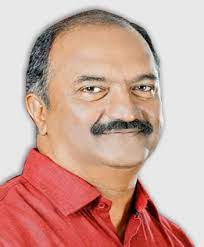
GST against federalism; time to restructure tax: Kerala's FM Balagopal
Kerala finance minister, K N Balagopal, who took charge on May 20, has attacked the concept of Goods and Services Tax (GST) claiming it is “antithetical to federalism to begin with”. Besides not yielding the promised revenue productivity, he told the Financial Express that there were “genuine concerns” over the democratic functioning of the GST Council."Cooperative federalism is at stake," he pointed out.

After Tamil Nadu finance minister, PTR Palanivel Thiagarajan had sharply questioned the “fundamental flaw” in the ‘one state, one vote’ principle that governs GST Council’s decision-making and issue of compensation to states at a May 28 GST Council meeting, it is now the turn of Kerala finance minister.
Kerala finance minister, K N Balagopal, who took charge on May 20, has attacked the concept of Goods and Services Tax (GST) claiming it is “antithetical to federalism to begin with”. Besides not yielding the promised revenue productivity, there were “genuine concerns” over the democratic functioning of the GST Council, he told the Financial Express.
“Cooperative federalism is at stake,” he pointed out.
The finance minister went on to urge the Union government to show statesmanship and remedy the damage caused by GST to state finances and fiscal powers. It is time to restructure the tax, he pointed out. Balagopal’s demand comes in the wake of many state finance ministers, including the highly-critical voices of West Bengal’s Amit Mitra and Punjab’s Manpreet Singh Badal, and public-policy experts asking for a complete overhaul of the structure, design and administration of the four-year-old consumption tax.
Balagopal also blamed the various national policies and the non-federal approach of the Centre for blocking Kerala’s efforts to address ‘second-generation’ issues concerning healthcare, education and employment. Though Kerala, which is facing the “rarest of rare” economic problems in the past four to five years, has always had a track record of “developing human capital”.
Also read: TN Finance Minister’s comment at GST meet sparks controversy
Hence, he asked the Centre to stop taking on a greater role than envisaged in the Constitution. If the Centre would correctly stick to the constitutional division of powers between the States and the Centre, then Kerala would emerge from this current crisis, he reiterated.
Further, Balagopal said in the interview with Financial Express that the GST Council should function democratically and decisions should be taken through consensus and “the process should look convincing to all”.
According to the finance minister, there is a widespread impression now that the Centre’s powers are increasing in fiscal matters. “This must be checked. All stakeholders in the GST Council must feel that justice prevails and is being delivered to them”, he pointed out.
However, he debunked the proposal to set up a dispute resolution body under the GST Council. His reasoning was that the Council, which is a body of senior political executives, is competent enough to resolve disputes and prevent them from arising. The Centre should shelve this notion that only they had good judgement in policy matters and appreciate that states knew better what was best suited for them.
“It ought to be recognised that states “are equal, equally mature and responsible partners in governance”, he said.
Meanwhile, the immediate priority of Kerala, severely impacted by natural calamities in the past few years, was to boost revenues in the medium term and aim for a higher GSDP growth and also enhance public spending and adopt a ‘health-first’ policy, he said.
According to Balagopal, income transfers to the people who lost livelihoods due to COVID-19 – ₹8,900 crore in the current fiscal; interest subsidy on loans routed via cooperatives to farm sector and MSMEs (₹8,300 crore) and continuing to boost public funding of infrastructure would help spur consumption in the state.
Also read: Kochi, Thiruvananthapuram in focus as global firms eye Kerala
Balagopal said tax receipts had faltered and gone below historic levels after GST’s introduction despite the GST compensation facility (assured 14 per cent annual growth) and S-GST receipts being half of state’s own tax revenue. In the revised FY22 budget presented on June 4, fiscal deficit is envisaged to sharply reduce from 4.25 per cent of GSDP in FY21 to 3.5 per cent in FY22 and, further to 3 per cent in FY23.
The state also planned to improve collection of taxes and also introduce new ones to facilitate a sharp medium-term fiscal correction envisaged in the budget, he shared with the business daily.
Balagopal, who had drafted a dissent note against GST as a member of a 2015 parliamentary select committee, said Kerala would object to any move to subsume sales taxes/VAT on petrol and diesel in GST, as it would limit the autonomous fiscal space of the states to a very low level. More than a third of Kerala’s own tax revenue comes from these levies.
The Kerala finance minister too strongly pitched for the GST compensation mechanism to be extended for five years beyond July 2022 since few states had seen natural growth rates in recent years.

